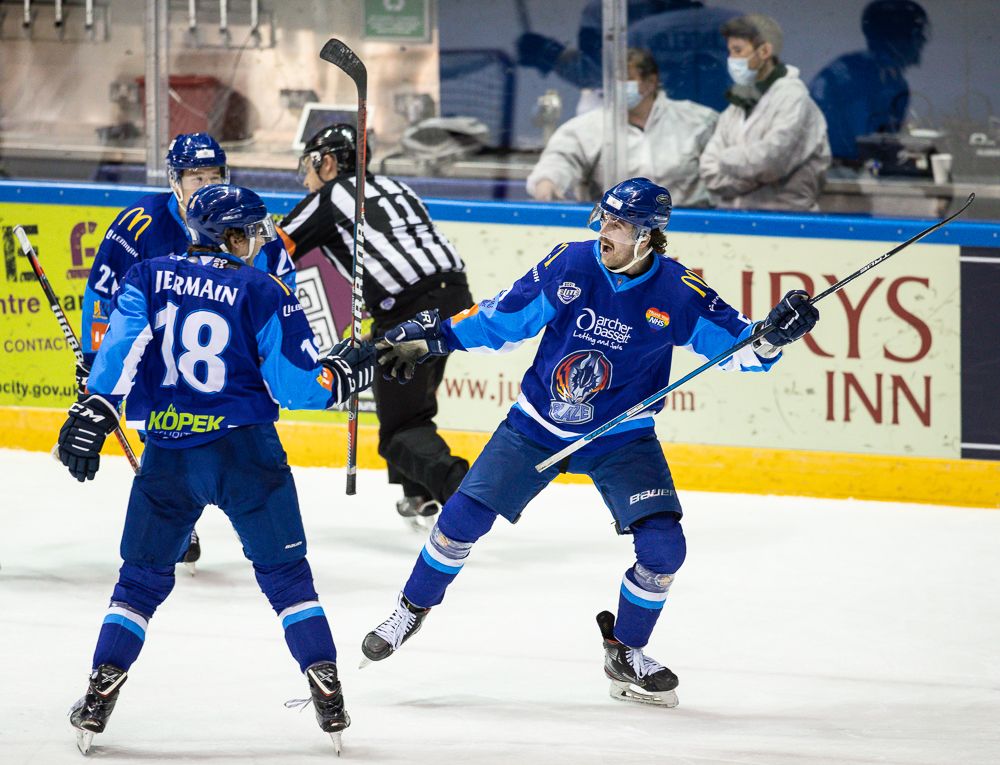Comment: EIHL roster rules a ‘slap in the face’ to homegrown players
As previously reported, a number of changes are coming to the Elite Ice Hockey League for the 2021/22 season. The trapezoid zone is in – and tweaks to faceoff procedures have been made – however, the biggest switch headed into the new campaign will affect the composition of Elite League rosters.
Of course, this isn’t news: we knew that changes were afoot before Tony Smith’s bombshell interview with Bob Westerdale in the Sheffield Star. The difference now is that the Elite League has published its full roster, transfer, and suspension regulations. And the new regime is worth talking about.
As Smith, who owns the Steelers and chairs the Elite League, unveiled last month, top-flight benches will be shorter this term. A maximum of 17 skaters and two netminders can be dressed by each team, with this year’s gameday roster import cap set at 14 players.
Throughout the season, clubs can register up to 28 players – including those on two-way deals – with a maximum of 20 non-homegrowns permitted.
(By the way, to qualify as ‘homegrown’, a player must have spent at least two campaigns or 24 months signed with a UK-based club before the end of their 18-year-old season.)
Teams can also make transfers throughout the year, with an injury reserve mechanism allowing coaches to sign players on short-term deals in the event of unavailability.
Finally, suspensions handed out by the Department of Player Safety will only apply to the individuals involved in the incident, with teams’ overall roster strength unaffected by player bans.
Returning to Smith’s comments from last month, it’s worth assessing why these changes have been made and what impact they will have on the sport’s growth in the United Kingdom.
We can’t afford to give lots of Brits ice time and then find the crowds diminish
– Tony Smith
“We have looked at various ways to cut costs this season while maintaining and improving standards,” Smith told The Star when explaining the EIHL’s decision to shorten benches. “It is a common-sense thing – we don’t know if [the aftermath of] Covid is going to bring in [smaller] crowds.”
However, critics argue that rosters – and costs – could have been cut by reducing the number of imports brought into the league. On that point, Smith said:
“It is down to quality. I am the first to advocate that we want quality on the ice, we were at 10 and 10 [import-Brit ratio] when I first joined the League in 2011. You bring me the crowds and I will bring you the Brits! But, right now, [Brits] don’t fill arenas…
“It is Catch 22, they want more ice time in the Elite League but we can’t afford to give lots of Brits ice time and then find the crowds diminish. That is what has happened, and it is a proven fact over the years. Get the young Brits in the NIHL first.”
Once again, British hockey has placed itself between a rock and a hard place. Smith argues that imports are a bigger pull than homegrowns – but there is little to suggest that is the case.
Before the pandemic struck, attendances were on the rise in the Elite League. On 16 March 2020, the league published a statement heralding its elevation to eighth in the European attendance standings, with Sheffield rising from 35th to 28th overall. A fortnight later, EIHL bosses confirmed that crowds had grown by 6.8% on the previous season, with 720,000 fans attending 239 league fixtures.
Team Great Britain’s success is also worth noting. Pete Russell’s national team is on an all-time high, with Liam Kirk leading the 2021 World Championship in goals and earning an entry-level contract with the Arizona Coyotes as a result.
In the women’s game, Casey Traill became the first Brit to be drafted to the Premier Hockey Federation (previously known as the NWHL).
So, why make it harder for British players to earn roster spots in the Elite League?
The sport, then, seemed to be in a good place before the pandemic struck. Attendances were on the rise – especially in cities with successful teams – and British players were experiencing unprecedented success.
So, why make it harder for British players to earn roster spots in the Elite League?
Consider this. The EIHL held the Elite Series to support Team GB’s preparations for the World Championship. In doing so, the league turned to young homegrown players from lower-league clubs to help put on the event. Those players excelled.
It is a slap in the face to block those players from making the step into the top-flight on the (questionable) premise that imports (some of whom are recent NCAA graduates) sell more tickets.
The Elite League has made a mistake.

Comments